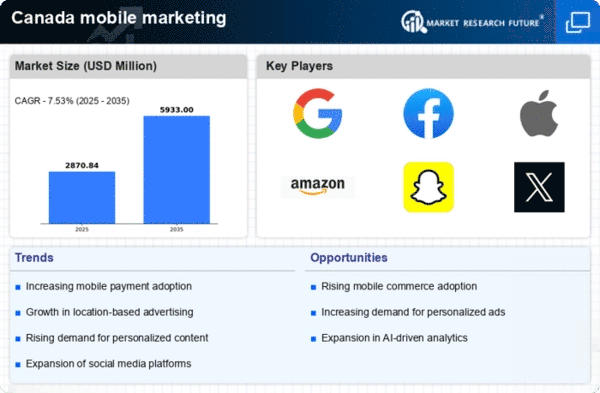Evolving Consumer Behavior
The mobile marketing market in Canada is being shaped by evolving consumer behavior, particularly among younger demographics. Research indicates that millennials and Gen Z consumers are more inclined to engage with brands through mobile platforms, with over 70% of these groups preferring mobile apps for shopping and communication. This shift in consumer preferences compels businesses to invest in mobile marketing strategies that resonate with these tech-savvy audiences. The mobile marketing market is thus adapting to these changes by creating interactive and engaging content tailored to mobile users. Additionally, the rise of social media platforms as marketing channels further emphasizes the need for brands to establish a strong mobile presence. As consumer behavior continues to evolve, companies that effectively leverage mobile marketing will likely gain a competitive edge in the marketplace.
Rising Smartphone Penetration
The mobile marketing market in Canada is experiencing a notable surge due to the increasing penetration of smartphones. As of 2025, approximately 85% of Canadians own a smartphone, which facilitates direct engagement with consumers through mobile marketing strategies. This high ownership rate allows businesses to reach a broader audience, enhancing the effectiveness of targeted advertising campaigns. Moreover, the proliferation of mobile applications provides brands with innovative platforms to connect with users. The mobile marketing market is thus poised for growth, as companies leverage the widespread use of smartphones to implement personalized marketing tactics that resonate with consumers. This trend indicates a shift towards mobile-first strategies, where businesses prioritize mobile channels to maximize their outreach and engagement efforts.
Advancements in Data Analytics
The mobile marketing market in Canada is being transformed by advancements in data analytics. As businesses increasingly rely on data-driven insights to inform their marketing strategies, the ability to analyze consumer behavior on mobile platforms becomes crucial. In 2025, it is estimated that over 50% of marketers in Canada utilize advanced analytics tools to optimize their mobile marketing efforts. This trend indicates a shift towards more personalized and targeted marketing campaigns, as companies leverage data to understand consumer preferences and behaviors. The mobile marketing market is thus evolving, with businesses employing sophisticated analytics to enhance their marketing effectiveness. By harnessing data analytics, companies can refine their mobile strategies, ensuring that they deliver relevant content to the right audience at the right time, ultimately driving engagement and conversion rates.
Growth of Mobile Internet Usage
The mobile marketing market in Canada is significantly influenced by the rapid growth of mobile internet usage. As of November 2025, mobile internet accounts for over 60% of total internet traffic in the country. This shift towards mobile browsing has prompted businesses to adapt their marketing strategies to cater to mobile users. The mobile marketing market is capitalizing on this trend by developing mobile-optimized websites and applications that enhance user experience. Furthermore, the increasing availability of high-speed mobile networks, such as 5G, is likely to further boost mobile internet usage, enabling richer content delivery and interactive advertising formats. This evolution suggests that companies must prioritize mobile marketing initiatives to effectively engage consumers who predominantly access online content via their mobile devices.
Increased Investment in Mobile Advertising
The mobile marketing market in Canada is witnessing a surge in investment in mobile advertising. In 2025, mobile advertising spending is projected to reach approximately $3 billion, reflecting a growing recognition of the effectiveness of mobile channels. Businesses are increasingly allocating budgets towards mobile ads, recognizing that mobile platforms offer higher engagement rates compared to traditional media. The mobile marketing market is benefiting from this trend, as advertisers seek to capitalize on the extensive reach of mobile devices. This increase in investment is likely to drive innovation in mobile advertising formats, such as video ads and interactive content, which can enhance user engagement. As companies continue to prioritize mobile advertising, the market is expected to expand, providing new opportunities for brands to connect with consumers.
















